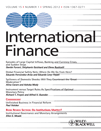
International Finance
Scope & Guideline
Illuminating trends in global financial practices.
Introduction
Aims and Scopes
- Global Financial Markets and Risk Management:
The journal emphasizes research on global financial markets, including risk management strategies and the analysis of market volatility and spillovers. It explores how various factors influence market behavior and investor decision-making. - Monetary Policy and Economic Stability:
A core area of focus is the role of monetary policy in maintaining economic stability. This includes studies on the effectiveness of different monetary policy regimes and their impacts on inflation, interest rates, and sovereign risk. - Emerging Markets and Capital Flows:
The journal frequently publishes research on capital flows to emerging markets, examining their sensitivity to global financial cycles and the effects of international economic conditions on local economies. - Financial Crises and Economic Recovery:
Another significant focus is on the implications of financial crises, such as the 2007-2008 financial crisis and COVID-19. The journal explores recovery strategies and the long-term effects of crises on investment and economic growth. - Cross-Border Financial Regulation and Policy:
The journal also addresses the regulatory frameworks governing international finance, including the impact of policy decisions on cross-border capital flows and financial stability.
Trending and Emerging
- Impact of Global Shocks:
Research focusing on the impact of global shocks, such as the COVID-19 pandemic, has surged. This reflects a growing interest in understanding how systemic events influence financial stability and market behavior. - Sustainability and Green Finance:
Emerging themes around sustainability and green finance are gaining traction, with studies examining how financial markets adapt to environmental concerns and the implications for investment strategies. - Digitalization in Finance:
The impact of digitalization on international financial markets is increasingly explored, highlighting how technology is reshaping trading, investment, and market dynamics. - Behavioral Finance and Investor Psychology:
There is a rising interest in behavioral finance, particularly how investor psychology influences market trends and decision-making processes amid uncertainty. - Monetary Policy Innovations:
Innovative monetary policy measures, particularly in response to crises, are becoming a focal point. This includes research on non-standard monetary policies and their effectiveness in different economic environments.
Declining or Waning
- Traditional Theories of Exchange Rates:
There has been a noticeable decrease in studies solely focused on traditional exchange rate theories. Instead, more emphasis is being placed on the impacts of global events and market dynamics on exchange rates. - Fixed Exchange Rate Regimes:
Research on fixed exchange rate regimes has diminished, likely due to the increasing complexity and variability of global financial systems, which favor more flexible approaches to currency management. - Historical Financial Crises Analysis:
While historical analyses of financial crises were once prevalent, recent issues show a shift towards contemporary crises and their immediate effects, suggesting a declining interest in historical comparisons. - Localized Economic Policies:
There is a decreasing trend in papers solely focused on localized economic policies without consideration of their international implications, as researchers are increasingly looking at global interdependencies. - Static Models of Financial Behavior:
The journal has moved away from static models that do not account for dynamic interactions in financial markets, favoring more complex, adaptive models that reflect real-world complexities.
Similar Journals

FINANCE A UVER-CZECH JOURNAL OF ECONOMICS AND FINANCE
Navigating Contemporary Financial ChallengesFinance: A Uver-Czech Journal of Economics and Finance is a distinguished academic platform published by Charles University in Prague, focusing on the multifaceted domains of economics and finance. Established in 1996, this journal aims to foster scholarly discourse by publishing high-quality research articles that address contemporary finance issues, economic theories, and their practical applications. With an ISSN of 0015-1920, the journal currently holds a Q4 category ranking in Accounting, Economics, and Finance, making it a vital resource for researchers, professionals, and students who seek to navigate the complexities of these fields. Although it does not offer open access, its contributions nevertheless enrich the academic community, endorsing critical analyses and innovative methodologies. Located in the heart of the Czech Republic, Finance is committed to exploring the intersections of finance and economics, thereby playing an essential role in the development of knowledge within the global scientific discourse.
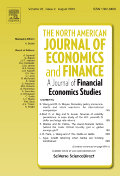
North American Journal of Economics and Finance
Advancing the frontiers of economic thought.The North American Journal of Economics and Finance is a premier academic journal published by Elsevier Science Inc. since 1992, dedicated to advancing the field of economics and finance through rigorous research and scholarship. With an impressive impact factor and recognition in the Q2 category for Economics and Econometrics and Q1 for Finance as of 2023, this journal holds a significant position in the academic community, ranked #41 out of 317 in Finance and #100 out of 716 in Economics. The journal features high-quality, peer-reviewed articles that cover a broad range of topics, from theoretical frameworks to empirical analyses and practical applications. Though not an open-access platform, the journal provides valuable insights for researchers, practitioners, and students alike, promoting knowledge dissemination in the dynamic landscape of economic and financial studies. With its commitment to excellence, the North American Journal of Economics and Finance serves as an essential resource for those seeking to deepen their understanding of contemporary issues in these critical fields.
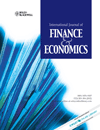
INTERNATIONAL JOURNAL OF FINANCE & ECONOMICS
Unveiling Insights for Financial ExcellenceInternational Journal of Finance & Economics, published by Wiley, is a premier academic journal that serves as a vital resource for researchers and professionals in the fields of finance, accounting, and economics. With an impressive impact factor and a reputation for excellence, the journal is recognized in the 2023 Scopus rankings, placing in the top quartiles across multiple categories, including Q2 in Accounting, Economics, and Finance. The journal has been a significant contributor to academic discourse since its inception in 1996, with its converged years extending to 2024, thereby ensuring the continuous advancement of knowledge in these critical areas. Although it operates under a traditional subscription model, its comprehensive articles provide insightful analyses, empirical research, and theoretical advancements that cater to a diverse audience—from seasoned scholars to emerging students in the field.
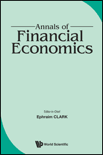
Annals of Financial Economics
Advancing the Frontiers of Financial KnowledgeAnnals of Financial Economics, published by World Scientific Publishing Co. Pte Ltd, is a premier scholarly journal catering to the fields of finance, economics, and international management. With an impressive impact factor and categorized in the Q2 quartile across multiple disciplines in the 2023 rankings, the journal holds a prominent position among its peers, evidenced by its ranking in the top 15% for Economics and Econometrics and Finance categories. The journal aims to foster high-quality, innovative research that addresses contemporary financial issues, making it a vital resource for researchers, professionals, and students alike. Although it does not operate under an open access model, it ensures that its contributions advance scientific discourse and provide valuable insights into financial theories, practices, and policies. With a historical publication span from 2005 to 2009 and again from 2011 to 2024, the Annals remains a critical platform for disseminating transformative ideas in financial economics, ensuring its relevance in a rapidly evolving scholarly landscape.
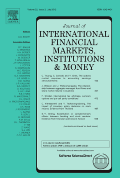
Journal of International Financial Markets Institutions & Money
Connecting Theory and Practice in FinanceThe Journal of International Financial Markets, Institutions & Money, published by Elsevier, serves as a leading platform for the dissemination of high-quality research in the fields of finance, economics, and econometrics. With an impressive impact factor reflected in its status as a Q1 journal in both categories for 2023, it ranks among the top journals, positioned at #47 out of 317 in Finance and #111 out of 716 in Economics. This journal offers a unique focus on the interplay between financial markets and institutions on a global scale, making it an essential resource for scholars, practitioners, and students alike. The journal welcomes innovative theoretical, empirical, and applied research, contributing to an exciting dialogue that shapes the future of international finance. For researchers looking to publish their findings, this journal is committed to rigorously engaging with contemporary financial phenomena, positioning itself as a vital cornerstone of academic and professional discourse.
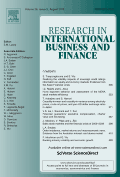
Research in International Business and Finance
Elevating discussions in the realms of business and finance.Research in International Business and Finance is a premier academic journal published by ELSEVIER, dedicated to advancing the field of international business and finance through high-quality research dissemination. With its ISSN 0275-5319 and E-ISSN 1878-3384, this journal stands out in the international research community, boasting an impressive Q1 ranking in both the Business, Management and Accounting and Finance categories for 2023. The journal aims to stimulate insightful discussions and provide a platform for innovative theories and practices from global perspectives, emphasizing empirical research and critical analysis. As it converges towards 2025, it continues to hold a prominent position in its fields, currently ranking #8 out of 189 in Business and #18 out of 317 in Finance according to Scopus. Although it does not offer open access options, the journal’s rigorous peer-review process ensures that only the most impactful research is published, making it an essential resource for researchers, professionals, and students striving for excellence in international business and finance.
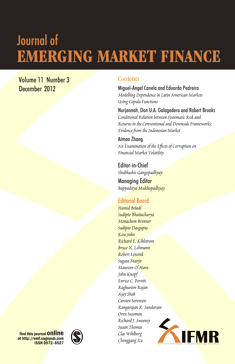
Journal of Emerging Market Finance
Bridging Theory and Practice in FinanceThe Journal of Emerging Market Finance, published by SAGE Publications India Pvt Ltd, is a premier academic journal that serves as a vital resource for researchers, professionals, and students in the fields of finance and economics. Established in 2002, this journal focuses on the multifaceted dynamics of emerging market economies and their financial systems. With an ISSN of 0972-6527 and an E-ISSN of 0973-0710, it has garnered attention with its respectable Q3 rankings in both the Economics and Econometrics and Finance categories, reflecting its commitment to high-quality research. Despite its limited open-access options, the journal remains a significant platform for scholarly discussions, providing insights on emerging financial instruments, market behaviors, and economic policies in developing economies. As a continuously evolving publication, it aims to bridge the gap between theory and practice, promoting an understanding of the complexities faced in these vibrant markets, ultimately serving the academic community with relevant and impactful research until 2024 and beyond.
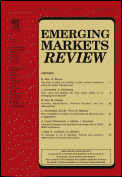
Emerging Markets Review
Transforming Research into Practical SolutionsEmerging Markets Review, published by Elsevier, stands as a leading platform for scholarly discourse in the fields of Business, International Management, and Economics. With a strong focus on the dynamic and evolving landscapes of emerging markets, this journal boasts an impressive impact factor, reflecting its high-quality research and significant contribution to the academic community. Covering a wide array of topics pertinent to emerging economies, the journal is dedicated to disseminating cutting-edge research findings, theoretical advancements, and practical insights that are essential for both researchers and industry professionals. Operating since 2000, and with its converged years extending to 2024, Emerging Markets Review has secured a Q1 category ranking in both its primary domains (Business and International Management; Economics and Econometrics), underscoring its critical role in shaping knowledge and practices in these fields. The journal's esteemed reputation is further highlighted by its strong Scopus rankings, placing it among the top percentile for relevant subject areas. Although it is not an Open Access journal, it remains accessible through institutional subscriptions, ensuring that the wealth of knowledge contained within its pages reaches a broad audience.
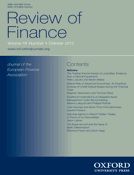
Review of Finance
Elevating academic discourse in finance and economics.The Review of Finance, published by Oxford University Press, stands as a premier academic journal in the fields of Finance, Accounting, and Economics. With an ISSN of 1572-3097 and an impressive track record stretching from 2001 to 2024, this journal is consistently recognized for its high-quality research, reflected in its Q1 rankings across key categories, including Accounting, Finance, and Economics and Econometrics. The Review of Finance is dedicated to advancing the understanding of financial phenomena through robust empirical and theoretical insights, making it an essential resource for researchers and professionals alike. Additionally, its strong Scopus rankings, placing it in the top percentiles, highlight its influence and relevance in ongoing academic discourse. Although the journal is not open access, it remains widely accessible through academic institutions, ensuring that its valuable contributions reach an extensive audience. The editorial board invites submissions that promise to further engage the academic community in the dynamic intersections of finance, accounting, and economic research.

Asia-Pacific Financial Markets
Illuminating Economic Policies and Market StrategiesAsia-Pacific Financial Markets is a distinguished academic journal published by SPRINGER, dedicated to advancing the field of finance research in the Asia-Pacific region. With an ISSN of 1387-2834 and an E-ISSN of 1573-6946, this journal fosters scholarly discourse on contemporary financial markets, investment strategies, and economic policy implications. Situated within the Q3 category in Finance for 2023, it ranks #140 out of 317 in the Scopus database, reflecting its growing significance and impact within the financial research community, as evidenced by its 55th percentile ranking. Since its inception in 1996, the journal has served as a pivotal platform for researchers, professionals, and students alike, featuring rigorous empirical studies and theoretical frameworks that address emerging financial trends and challenges. While it operates under a subscription model, the journal's comprehensive scope and commitment to high academic standards make it an essential resource for anyone looking to deepen their understanding of finance in the dynamic Asia-Pacific landscape.